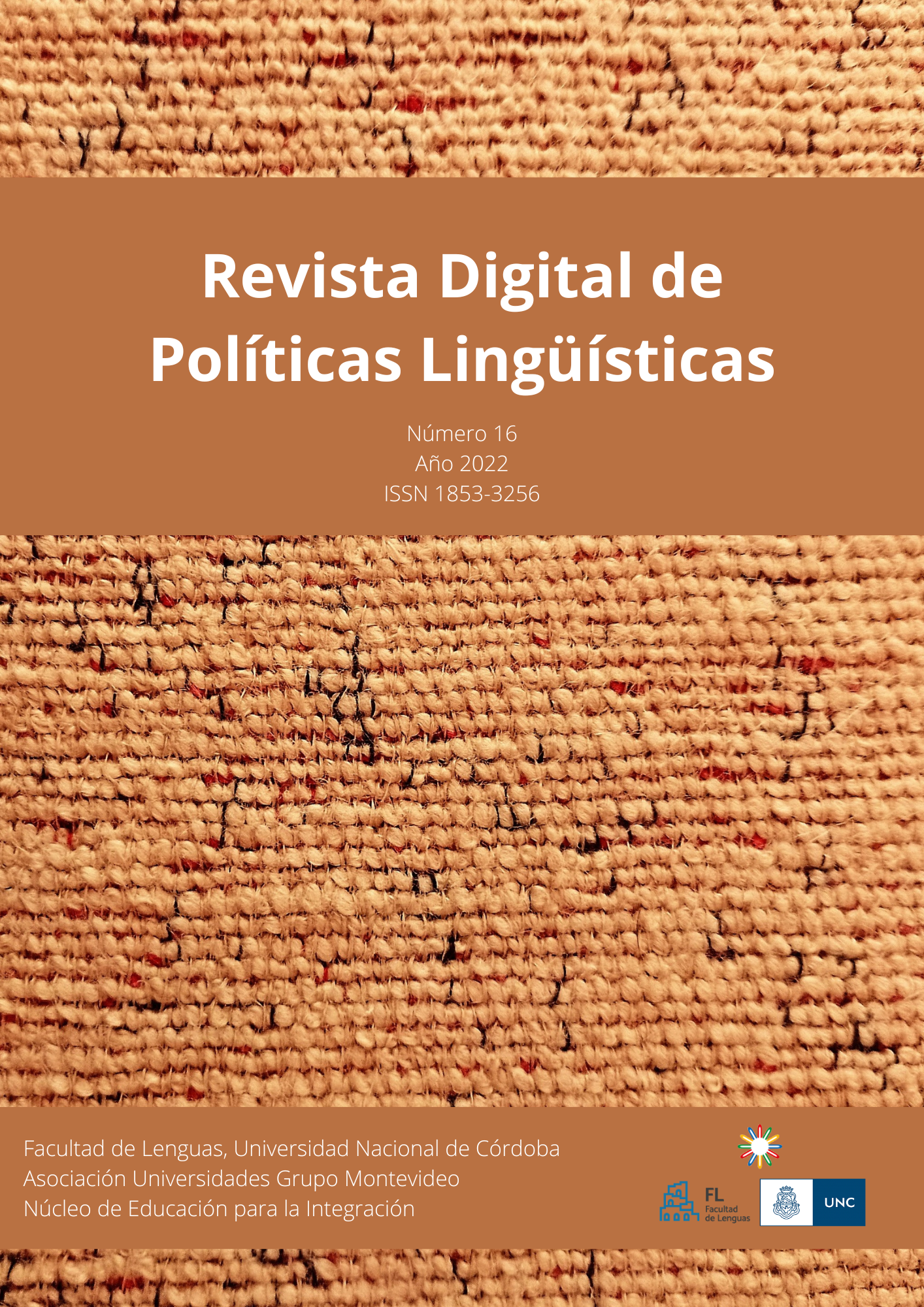The Yiddish language in the city of Buenos Aires: speakers, possible speakers and post-speakers
Abstract
In this article, we explore which expressions of Yiddish are remembered by the generation born in 1970 and 1980, children and grandchildren of Yiddish speakers. We make comparison with the generation born in 1940 and we use the framework proposed by Georg Kremnitz, who returns to Robert Lafont’s classification, 1971 (in Kremnitz, 2021: 50) and proposes a typology of 5 categories, which establishes a scale at whose extremes are 1. Full-time speakers and 5. Non-speakers. Thus, we approach the transmission of the language and the second generations’ of immigrants memory of Yiddish to understand which expressions were transmitted and remembered by subsequent generations.
Downloads
References
Ansaldo, Paula. (2018). “Teatro popular, teatro judío, teatro independiente: una aproximación al Idisher Folks Teater (IFT)”. Culturales, 6. Disponible en https://dx.doi.org/10.22234/recu.20180601.e345
Bein, Roberto. (1996). “La equivalencia cero interlingüística”, en Voces, Revista del Colegio de Traductores Públicos de la Ciudad de Buenos Aires. Número 24. Pp. 2-9.
Bres, Jacques. (1999). “L’entretien et ses techniques”. En Calvet, Louis-Jean et Pierre Dumont (dirs.), op. cit.
Dujovne, Alejandro. (2008). “Cartografía de las publicaciones periódicas judías de izquierda en Argentina, 1900-1953” Revista del Museo de Antropología 1(1): 121-138. Facultad de Filosofía y Humanidades. Universidad Nacional de Córdoba.
Fainstein, Paula (2019) “Préstamos intracomunitarios “desbordados”: el ídish en el español bonaerense” en Riestra, Dora y Nora Múgica eds. Estudios SAEL. Bahía Blanca, Ediuns y SAEL, pp. 137-150.
Feierstein, Ricardo (1993) Historia de los judíos argentinos. Buenos Aires. Planeta.
Fischman, Fernando (2011). “Using Yiddish: Language Ideologies, Verbal Art, and Identity among Argentine Jews” en Journal of Folklore Research 48(1), 37-61. Indiana University Press.
Fishman, Joshua (1991) Yiddish: turning to life. Philadelphia: John Benjamin Publishing Company.
---------- (2001) Can Threatened Languages Be Saved? Reversing Language Shift Revisited: A 21st Century Perspective. Clevedon: Multilingual Matters Ltd.
Gugenberger, Eva (2007) “Aculturación e hibricidad lingüísticas en la migración: Propuesta de un modelo teórico-analítico para la lingüística de la migración” en Revista Internacional de Lingüística Iberoamericana, Vol. 5, No. 2 (10), Lengua y migración en el mundo hispanohablante (2007), pp. 21-45.
Kremnitz, Georg (2021) “Posthablantes y funciones míticas de lenguas en contacto” en Revista Digital de Políticas Lingüísticas. Año 13, Volumen 15, pp. 49-56.
Lotersztain, Israel (2018) “The Abandonment of Yiddish by the Jewish-Argentine Communist ICUF”. En Chinsky, Malena y Alan Astro (Eds.) Splendor, Decline, and Rediscovery of Yiddish in Latin America. Leiden. Brill.
Mirelman, Víctor (1988) En búsqueda de una identidad: los inmigrantes judíos en Buenos Aires, 1890 – 1930. Buenos Aires. Milá.
Real Academia Española: Diccionario de la lengua española, 23.ª ed., [versión 23.5 en línea]. <https://dle.rae.es> [06 de julio de 2022].
Romaine Suzanne (1995) Bilingualism. Oxford: Blackwell.
Sinay, Javier (2021) La caja de letras. Buenos Aires: Ediciones del empedrado.
Skura, Susana (comp.) (2012) Reflexiones sobre el ídish. Buenos Aires: Sholem, Mil años.
----- (2019) Yiddish Theatre in Buenos Aires between the Two World Wars. Disponible en https://web.uwm.edu/yiddish-stage/yiddish-theatre-in-buenos-aires-between-the-two-world-wars#:~:text=Since%201901%2C%20Buenos%20Aires%20has,cu ltural%20practices%20o f%20Argentine%20Jews
Slavsky, L., Skura, S. (2002a) “1901-2001 – 100 Años de Teatro en Ídish en Buenos Aires”, en Feierstein, Ricardo y Stephen A. Sadow (comp.), Recreando la Cultura Judeoargentina 1984-2001: en el umbral del segundo siglo. Buenos Aires, Milá, pp. 294-308.
Svarch, Ariel (2008) Jewish Communist Culture and Identity in Buenos Aires: Ideas on Comparative Approaches. Paper for the UC/Utrecht Symposium on Jewish Politics and Political Behavior 12. Disponible en http://perush.cjs.ucla.edu/index.php/volume-2/jewish-urban-history-in-comparative-perspective-jewish-buenos-aires-and-jewish-los-angeles/-5-ariel-svarch-jewish-communist-culture-and-identity-in-buenos-aires-ideas-on-comparative-approaches
Visacovsky, Nerina (2007) Las escuelas obreras judías durante la década del veinte en Argentina, musa inspiradora de la pasión anticomunista del Senador Matías Sánchez Sorondo. XI Jornadas Interescuelas/Departamentos de Historia. Universidad de Tucumán.
Zadoff, Efraim (1994) Historia de la educación judía en Buenos Aires (1935 – 1957). Buenos Aires: Milá.
Published
Issue
Section
License

This work is licensed under a Creative Commons Attribution-NonCommercial-NoDerivatives 4.0 International License.
Aquellos/as autores/as que tengan publicaciones con esta revista, aceptan los términos siguientes:
- Los/as autores/as conservarán sus derechos de autor y garantizarán a la revista el derecho de primera publicación de su obra, el cual estará simultáneamente sujeto a la Licencia de reconocimiento de Creative Commons que permite a terceros compartir la obra siempre que se indique su autor y su primera publicación esta revista.
- La cesión de derechos no exclusivos implica que la publicación de los artículos en la presente revista no quita la posibilidad o el derecho al autor de publicar de manera posterior a otras revistas u órganos editoriales y la autorización por parte de los autores para que el trabajo sea depositado en los repositorio institucionales: Portal de Revistas de la Universidad Nacional de Córdoba.



